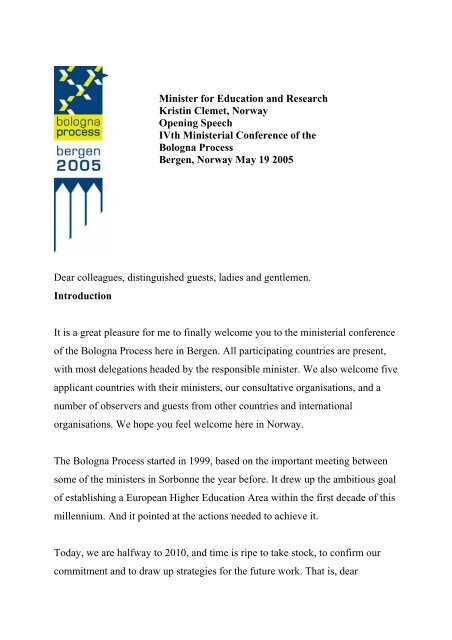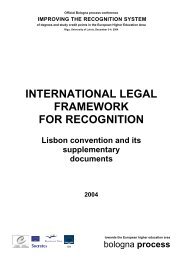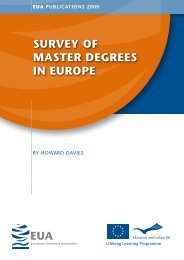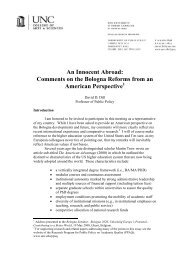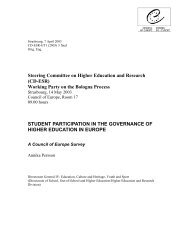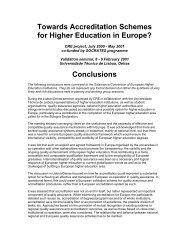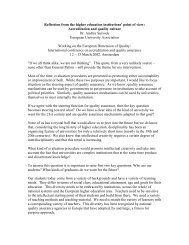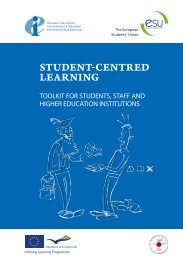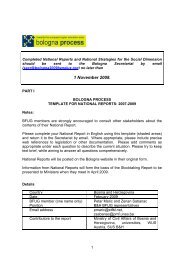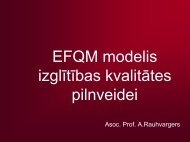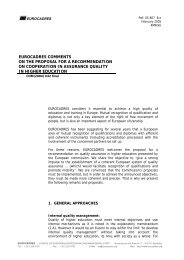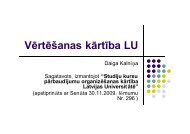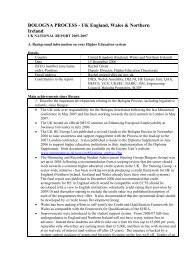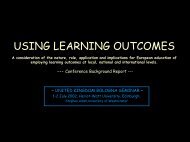Dear colleagues, distinguished guests, ladies and gentlemen ...
Dear colleagues, distinguished guests, ladies and gentlemen ...
Dear colleagues, distinguished guests, ladies and gentlemen ...
You also want an ePaper? Increase the reach of your titles
YUMPU automatically turns print PDFs into web optimized ePapers that Google loves.
Minister for Education <strong>and</strong> ResearchKristin Clemet, NorwayOpening SpeechIVth Ministerial Conference of theBologna ProcessBergen, Norway May 19 2005<strong>Dear</strong> <strong>colleagues</strong>, <strong>distinguished</strong> <strong>guests</strong>, <strong>ladies</strong> <strong>and</strong> <strong>gentlemen</strong>.IntroductionIt is a great pleasure for me to finally welcome you to the ministerial conferenceof the Bologna Process here in Bergen. All participating countries are present,with most delegations headed by the responsible minister. We also welcome fiveapplicant countries with their ministers, our consultative organisations, <strong>and</strong> anumber of observers <strong>and</strong> <strong>guests</strong> from other countries <strong>and</strong> internationalorganisations. We hope you feel welcome here in Norway.The Bologna Process started in 1999, based on the important meeting betweensome of the ministers in Sorbonne the year before. It drew up the ambitious goalof establishing a European Higher Education Area within the first decade of thismillennium. And it pointed at the actions needed to achieve it.Today, we are halfway to 2010, <strong>and</strong> time is ripe to take stock, to confirm ourcommitment <strong>and</strong> to draw up strategies for the future work. That is, dear
concerns. Let me refer to a comment made by the secretary general of theAfrican Association of Universities, Aki Sawyerr. He has said that he was afraidthat a one-way student flow to the European Higher Education Area from aregion like Africa, combined with restrictive immigrations policies, might resultin what he called an “intellectual festung Bologna”.This is a concern we have to take seriously. It reflects an anxiety that Europe isneglecting its obligations towards the poorer parts of the world. I think weshould signal clearly that such an anxiety is not justified. In Berlin we stated that“in international academic co-operation <strong>and</strong> exchanges, academic values shouldprevail”. I believe we are all concerned that the relations between the EuropeanHigher Education Area <strong>and</strong> the rest of the world should be governed by fairnessin a responsible way.I welcome the interest from countries outside Europe for the process. They wantto learn from our experiences <strong>and</strong> find ways to join us in our efforts. This showsan increased interest for Europe as a source for co-operation <strong>and</strong> sharing ofknowledge <strong>and</strong> competence. This, I think, is a very promising developmentemerging from the Bologna process. We should carefully discuss how we maystimulate this development, <strong>and</strong> share experiences with other regions of theworld.Last, but not least, I would like to focus on the implementation. The work so farhas focussed on the structural elements of the Process. From the stocktakingreport it is quite evident that we have come a long way towards implementingthe structural elements of the Process.In our future work we may have to focus more on the implementation of theelements of the Process. In this work the role of strong <strong>and</strong> autonomous
universities <strong>and</strong> other higher education institutions will be central.Implementation means change inside institutions, in programmes <strong>and</strong> in ways ofengaging students in the learning process. I think we all have our nationaldiscussions at both the political <strong>and</strong> institutional level about this. We will later inthis conference discuss the future contact between the process <strong>and</strong> organisationsof university staff. We should here signal that we welcome them as constructivepartners in the process.ConclusionColleagues, <strong>ladies</strong> <strong>and</strong> <strong>gentlemen</strong>,At this stage of the process we should also start thinking on the process Beyond2010, when the European Higher Education Area hopefully is in place. I willtherefore invite ministers to discuss different options for how the process mightdevelop during our meeting. This is meant only as the start of a discussion, but Ibelieve it may become a crucial point for our future agenda.As politicians we must work to realise ideas, ambitions <strong>and</strong> hopes. So, toconclude my opening address, let me convey some of my hopes for this process:• Within 2010, we should observe a distinct improvement in the quality ofEuropean higher education.• At the same time, the national systems of higher education shouldcommunicate in order to facilitate mobility for students <strong>and</strong> staff withinEurope.• In addition, we will have systems of quality assurance <strong>and</strong> qualityimprovement in all countries.• In other words, we should aim at making Europe stronger <strong>and</strong> moreattractive to good students <strong>and</strong> researchers. This will be to the benefit of


